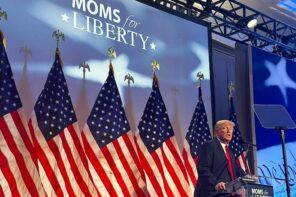In the Wisconsin farmhouse of my youth the room at the top of the stairs had no name. With open shelving at one end, it was just a storage space for “miscellaneous”: unused furniture, some fright-inducing butcher’s tools, canning equipment, etc. But there was also a kind of family reliquary up there, a pie safe filled with old books.
The trove included old Bibles and Psalters in Dutch but it also included volumes that reflected my grandfather’s early intellectual curiosity: e.g., a large book illustrating U.S. naval power during the era of the “Great White Fleet,” humor by Bill Nye and Ambrose Bierce, and, quite amazingly, Darwin’s Descent of Man.
I mention this because my grandfather, born to immigrants in 1878, was undoubtedly familiar with the all-but-forgotten figure of Robert Green Ingersoll, the “Great Agnostic,” who popularized Darwin for the millions, who championed the disgraced Thomas Paine, and who kept alive the important tradition of American free thought during the last quarter of the 19th century. Ingersoll’s sold-out lectures were widely reported in newspapers of the time, so that even people who never heard this spectacularly gifted speaker in person could occasionally quote irreverent scraps from “Some Mistakes of Moses” and other Ingersoll set pieces.
Susan Jacoby has done us a great favor by bringing Ingersoll and his times fully to life in a model short biography recently published: The Great Agnostic: Robert Ingersoll and American Freethought. Secularism and feminism have been Jacoby’s own primary themes, making her Ingersoll’s ideal biographer. Jacoby is unabashed in her admiration for her subject, and she has every reason to be a fan of someone who lived an entirely admirable life.
Born in 1833, Ingersoll grew up poor, as his dad, an unsuccessful Presbyterian minister, lurched from one failed pastorate to another. Ingersoll would later reduce audiences to helpless laughter in recalling the grim Sabbaths of his youth, when, after many hours in church, the Ingersoll children might be allowed to visit the graveyard “to cheer us up a little.”
Both parents were outspoken Abolitionists, which helped form young Robert’s lifelong loathing of slavery and Jim Crow. Like his hero, Lincoln, Ingersoll was primarily self-educated, “reading” for the bar as Lincoln had done rather than attending any law school. His politics were Republican but hardly of a kind that we would recognize today: large-minded and liberal. Ingersoll spoke out sharply against misogyny and violence against women, including spousal abuse; he supported birth control; he opposed against corporal punishment and vivisection; he thought that Henry George was right about real estate ownership; he embraced unions and was admired by Eugene V. Debs even though he sometimes represented railway tycoons in his private law practice.
Ingersoll’s barbed attacks on “superstition” and religious flummery were tolerated in part because he was so good-humored and generous to friends and enemies alike—and also because his renown for matchless oratory in political life and in courtrooms gave him a degree of protective cover. When he died, in 1899, numerous obituaries and editorials deplored how he had used his great gifts to mock religion, some even noting that he could have been elected to high office—possibly the White House—had it not been for his unfortunate impiety.
Jacoby’s point, however, and mine, is the extent to which Bob Ingersoll’s take-downs and anti-religious fulminations were not merely tolerated but welcomed in a late-19th-century American culture that seems far more open-minded than our own.
Everyday people in Ingersoll’s day—churchgoers and doubters alike—could relate to his insistence that the framers
“knew that to put God in the Constitution was to put man out… They knew the terrible history of the church too well to place in her keeping, or in the keeping of her God, the sacred rights of man… They intended to found and frame a government for man, and for man alone.”
Everyday people loved hearing Ingersoll’s stock response to repeated pleas from Protestant clergy to insert a reference to God in the Constitution (a move Lincoln had resisted during the height of the Civil War): “if there is to be an acknowledgement of God in the Constitution, the question naturally arises as to which God is to have this honor.”
Everyday people relished Ingersoll’s swipes at the absurdity of politicians’ throwaway pieties. (One can imagine what Ingersoll would have done with our current president’s stated reliance on “daily devotionals” that are Blackberried to him by former Office of Faithiness chief Joshua Dubois.) In fact, Ingersoll loved nothing more than to skewer such faithiness in public life:
At present, the successful office-seeker is a good deal like the centre of the earth; he weighs nothing himself, but draws everything else to him… Candidates are forced to pretend that they are Catholics with Protestant proclivities, or Christians with liberal tendencies, or temperance men who now and then take a glass of wine, or, that although not members of any church their wives are, and that they subscribe liberally to all. The result of all this is that we reward hypocrisy and elect men entirely destitute of real principle; and this will never change until the people become grand enough to do their own thinking.
For Ingersoll to be so thoroughly secular reflected, in part, the immense impact of scientific thinking and scientific research that had, in his time, begun to make major strides against illness and other forms of preventable suffering. Science and science education were seen as overwhelmingly beneficent, and while the findings of Darwin and others rattled the nerves of persons raised to think of humans as the crown of creation (they rattled Darwin’s own nerves), Americans in Ingersoll’s time were on the whole less anti-scientific than those of our own time, when just under half of adult Americans tell pollsters they do not accept evolutionary theory.
Ingersoll was brilliantly able to allay lingering anxieties about the indignity of human kinship with other species. In his lectures he deftly showed that the idea of an ascending humanity has rather more dignity in it than the notion of “fallen” humanity offered by Genesis and centuries of church teaching.
But if Ingersoll was a secularist in the sense of using science to demolish holy writ, he was even more importantly secular in the sense of understanding the stakes in the fight for a secular state. He constantly reminded audiences of the rivers of blood that had been spilled by so-called “blasphemers” at the hands of God’s self-appointed ministers throughout the centuries. Ingersoll was acutely conscious that had he lived a mere 100 years earlier, his own views on the God question could easily have set him on the path to a blasphemer’s martyrdom.
Ingersoll the ardent secularist was equally the passionate humanist. Warm and funny in private, he was that same warm and witty person at the lectern. He was welcomed as a good speaker for funerals, not in any way diminishing the burden of grief or dismissing the element of mystery in the human passage. His argument with religion, which he liked to say hardened the heart even as it softened the brain, was in many ways an argument against cruelty: he never tired of pointing out how religion had historically sanctioned every conceivable cruelty. He loved poetry and music, was devoted to his wife and daughters, and gave his money away freely.
Jacoby makes a convincing case that Ingersoll belongs to the egalitarian and humanistic thread of American secularism rather than Social Darwinist thread. And, in fact, Ingersoll stoutly rejected the contempt for the “lower orders” (immigrants, people of color) that was being shown in the 1880s and onward by leading Darwinists like Herbert Spencer and William Graham Sumner.
Unlike today’s New Atheists, Ingersoll was able to interact easily and respectfully with the more progressive religious leaders of his time. His clarity and passion influenced almost everyone, from Mark Twain and Walt Whitman to Andrew Carnegie and Thomas Edison, and from Frederick Douglass and Margaret Sanger to Gene Debs and “Fighting Bob” La Follette.
Jacoby writes correctly that there is no establishment figure today who would dare to say, as Ingersoll said loudly and often, that the glory of America’s founding generation lies precisely in the fact that they consciously did not establish a Christian nation.
There is no establishment figure today (Bill Maher does not count) who would dare to have huge public fun at the expense of the pious in the Ingersoll manner—and thus also make it permissible for others to have such fun. Worst of all, there is no establishment figure today who seems quite to understand in his or her gut why creeping religious oppression—why the endless waves of abortion and contraception restrictions, the bogus infringement arguments of the Catholic bishops, the new state-level subsidies for religious education, the David Barton-inspired alt-histories of the country’s founding—must be firmly and fiercely resisted. Resisted not in a muffled, apologetic way but robustly and in the best tradition of American democracy.
There’s no question that Ingersoll and kindred free spirits like Twain and Bierce made the United States a much healthier country during the Gilded Age than it otherwise would have been. A certain tonic looseness, a good-humored irreverence and respect for unbelief, persisted in the common culture until the horrors of World War I gave fear-based faith a new lease on life.
In this nerve-wracked 21st-century moment, our homegrown Taliban would not have God mocked in any way, for God absolutely must bless and prosper the United States of America. Where religion is concerned we have plenty of cynics today, but we have almost no outright critics of religious arrogance or staunch resisters against religious intrusion. We are much the poorer for it.




